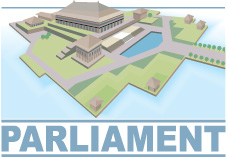Parliament on Thursday approved regulations under the Motor Traffic Act, to introduce a Driver Improvement Points System (DIPS) for motorists in the country, but, despite it being a move in the right direction to keep tabs on errant drivers, its effective implementation is crucial for the system to work.
Transport Minister Kumar Welgama introducing the regulations to the House, said “the DIPS should lead to more disciplined and road-rule abiding drivers, as those who exceed 23 points within a span of two years, would have their licences suspended for a year. The number of points one earns would depend on the severity of the offence committed.”
The Minister told the House, the long term implementation of the system would be a computerised one. It would commence by issuing forms on which the points would be recorded, which would in turn be sent to the Registrar of Motor Vehicles (RMV) Department to keep tabs on errant drivers.
While the system is laudable, given the alarming number of road accidents that take place in the country, around 150 per day, with an average of six deaths, according to the interim report of the Parliamentary Select Committee (PSC) that was appointed to look into it, proper implementation holds the key to it being an effective system.
Senior Minister for Food Security P. Dayaratne, who heads the PSC, said that, “tough road rules are needed to make the roads safe for everyone. Around 2,600 people were killed in accidents last year. These regulations would be of great benefit to secure the lives of drivers, commuters as well as pedestrians,” he said.
DNA MP Sunil Handunnetti was skeptical about how effectively the rules would be implemented, when he spoke during the debate, saying such regulations would be admirable if everybody was equal before the law. “There is room for such a system to be manipulated, “he said.
The newly introduced regulations are among those contained in the national Action Plan for Road Safety, which have been compiled by taking into consideration some of the recommendations of the PSC.
Among its other recommendations is the three-year probation period after obtaining the licence, and making it mandatory for children less than eight years to travel in the rear seat.
Several UNP MPs who spoke during the debate, welcomed the regulations, but Chief Opposition Whip MP John Amaratunga raised the issue of the increase in private bus fares, saying that it was unfair by the commuters. “You have made room for the rich people to benefit, but no one cares about the hardships faced by the commuters,” he said.
DNA MP Anura Kumara Dissanayaka too lambasted the Government for siding with bus owners and ignoring the plight of the passengers.
However, Minister Welgama said that private bus owners entered into an agreement with the Government not to stage bus strikes for a period of one year, after being granted the 20% fare hike.
|


